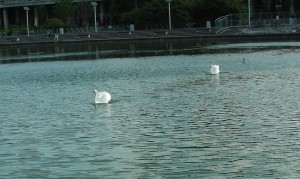Author note: the workshop had 19 participants and it is too recent for any evaluation data to have reached us. However the talking nature of the workshop did seem to enable the participants to explore the use of the humanities and to compare the contexts of their use in small groups and in the plenaries. My impression is that we ran out of time to synthesise our experiences and to offer more than a few ideas for the future use of the humanities. If there are positive indications from the evaluation data or from other feedback then we should be keen to develop this initiative further in our teaching and at the Veterinary Education Symposium in 2014 in Bristol.
Robbé, I.J. Memorial University, Newfoundland; and Gardiner, A. Royal (Dick) School of Veterinary Studies, University of Edinburgh
Abstract
There are increasing concerns about the mental and physical health of veterinary students as they strive to cope with expanding contents of the curriculum, the requirements for lifelong learning and multiprofessional practice, and the rising demands of informed clients. Hence veterinary practice is more than biomedicine with its emphasis on the cognitive and psychomotor domains and competencies in the affective domain are achieving greater prominence in undergraduate veterinary education.
Aim: to discuss how the humanities can be used to contribute to producing “Day One” graduate vets who are affectively, cognitively and psychomotor competent, socially and culturally aware, and able to think creatively and critically.
The workshop’s objectives are (1) to explore the use of the humanities in veterinary education (2) to compare the contexts where the participants have used the humanities (3) to offer ideas for the participants to use in their teaching.
Cycles of plenaries and small group work will be used to draw on examples by the participants from the humanities e.g. art (drawing or history), film, history, archaeology, philosophy (ethics), gender studies. Specific examples from our experiences will be available e.g. oral histories, poetry (haiku), literature.
The purposes of these activities will be to discuss and compare the uses of the humanities: what was used, why, what were the outcomes, what did the evaluation identify, what are the future plans. At the conclusion, the workshop will seek reflections from the participants and offer ideas for their teaching. A handout with references to source materials will be provided.
References:
Bradshaw, G.A.2009 Elephants on the Edge. What Animals Teach Us about Humanity. New Haven and London: Yale University Press.
Degeling, C. 2012 Narrative Medicine: Learning Through Stories. Veterinary Record,522-523.
Horowitz, B.N. & Bowers, K. 2012 Zoobiquity: What Animals Can Teach Us About Being Human. London: Virgin Books.
Peterkin, A. 2013 Health, Arts, & Humanities Program. http://health-humanities.com [Accessed Jun 10th 2013]
Quammen, D. 2012 Spillover. Animal Infections and the Next Human Pandemic. New York and London: W M Norton.
Weisert, H. & Stone, E.A. 2012 Animal Companions, Animal Doctors, Animal People. Guelph: Ontario Veterinary College.

